How to Pack For a Two Night Backpacking Trip
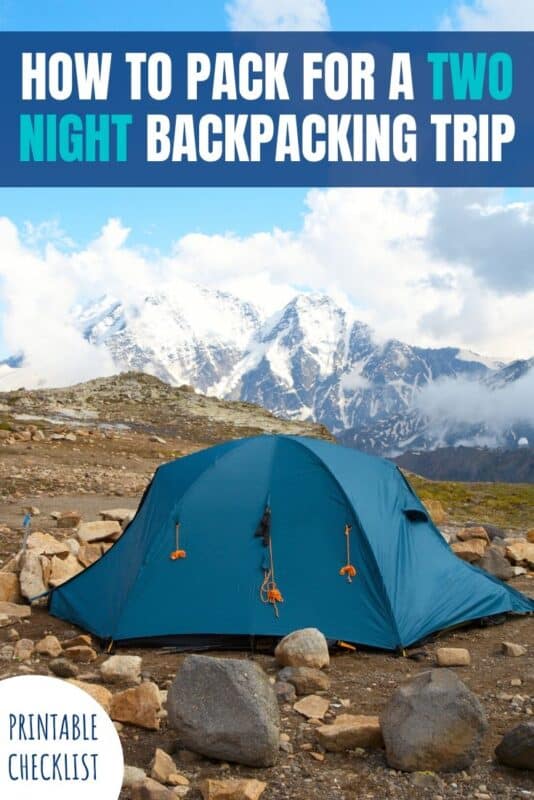
Are you wondering how to pack for a two night backpacking trip? Today I am sharing a complete listing of things that you should bring when heading out on a shorter trek.
Backpacking is somewhat different than traditional camping because everything that you need for your trip is carried with you, in a pack, on your back. The weight and quality of your equipment is everything.
Often while backpacking you may be miles from the nearest trail head or cell service. It is extremely important to be mindful of this and be prepared to be self sufficient. Planning a longer trip? Be sure to also read what to pack for a five night backpacking trip.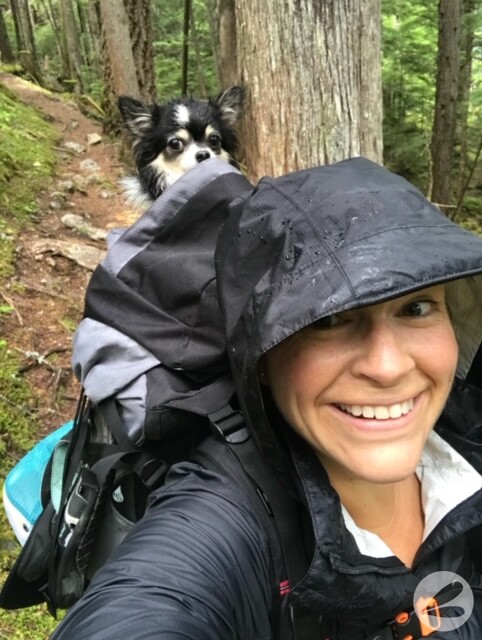
How to pack for a two night backpacking trip:
When planning for a backpacking trip I often start months in advance. I begin with researching my destination and getting as much information as I can about the route I plan on hiking. Many resources can be found online, in Facebook groups and in guidebooks. For example when I hiked the West Coast Trail this Guidebook: Blisters & Bliss (aff link) was super helpful! But not all trails come with a guidebook so be sure to ask fellow trekkers for advise and insight on where you plan on going.
Next I review all of my gear and make sure that it is all in good condition and in working order.
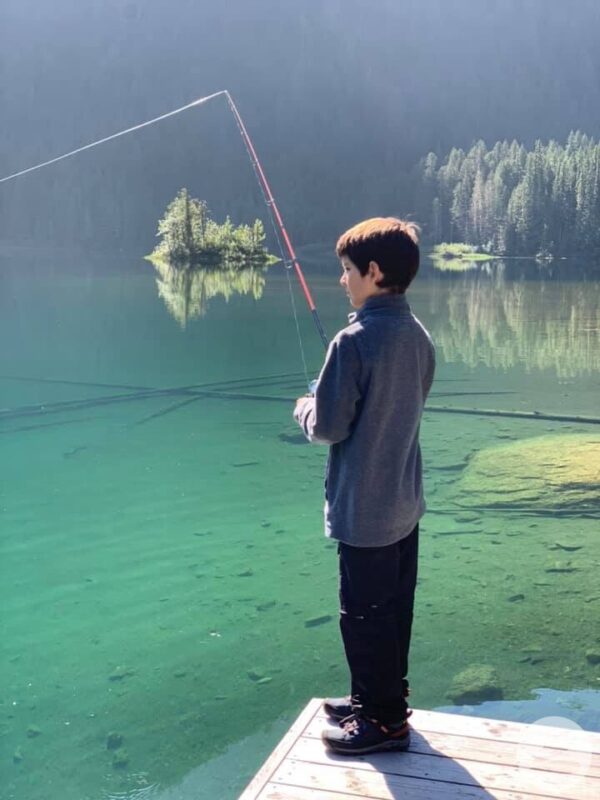
How to inspect your backpacking gear:
- Open the tent and look for tears or defective zippers and ties.
- Unroll your mat and sleeping bag and inspect for mold and/or holes.
- Look at the backpack that you plan on using and test the zippers and buckles.
- Pull out your cookware and inspect it for rust or defects. Make sure that you have enough fuel for your trip. Make sure that the stove works by turning it on and testing it out.
- Check out the headlamp, matches & water filtration system that you plan on using and make sure that they are all in good working order.
- Tip: when in doubt put new batteries in your gear!
As a smaller woman who is 5’2″ I put a lot of consideration into how much weight that I plan on carrying in my backpack. The recommendation is to carry up to 20% of your body weight. For shorter trips I tend to allow myself some luxuries because I am not hiking for as long or as far. For longer trips I am especially mindful of how much weight I am carrying for a longer duration of time. Tip: pack a few luxuries if space and weight allows. One thing that I like to pack if possible is a lightweight hammock for the boys.
What to consider when purchasing gear:
- The weight of your equipment. When planning for my WCT trip I weighed out and measured everything, right down to my underwear. As a general rule you want to purchase gear that is as lightweight and compact as possible.
- Size of the equipment. The space that your gear takes up in the backpack is important to consider.
- Do your research before buying! I found that a lightweight backpacking tarp from MEC was $30 but a basic tarp from Walmart was actually lighter and only cost $4.
- Not all gear is created equal. The quality of your gear is very important. The last thing you want while backpacking in the wilderness is a leaky tent or cold sleeping bag. Invest in quality pieces when you can.
Considerations for meal planning:
- Hiking and backpacking burns a lot of energy so be sure to pack calorie rich foods.
- Pack light! Dehydrated meals that can be cooked by just adding hot water are the best.
- Include snacks and foods that travel and pack well like protein bars, beef jerky and hard cheese.
Check out my 20+ Backpacking Food Ideas for lots of foods to pack for backpacking. Or these Keto Backpacking Food Ideas if you are following a low carb lifestyle.
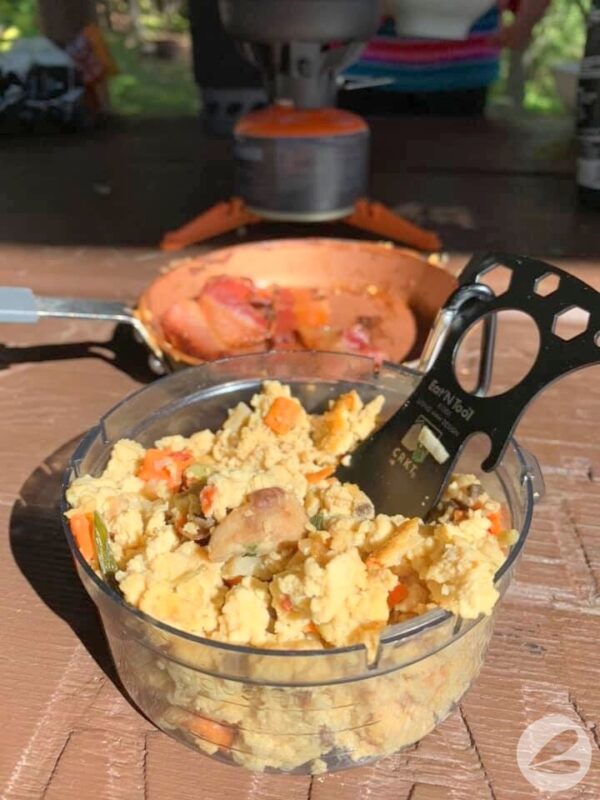
What I pack for shorter backpacking trips:
Essentials:
Tent
Sleeping pad
Sleeping bag
Minimum 50 L backpack
Dry bags x2
1 litre water bottle
Pristine water tabs
Headlamp
Jetboil
Fuel
Spork
Fire starter
Waterproof matches
Toilet paper
First aid kit
Map / compass
Knife
Toiletries
Clothing:
Hiking boots
Rain jacket
Rain pants
Gators
Hiking pants
Hiking shorts
Wool socks
Underwear
Quick dry t-shirt
Fleece sweater
Sunglasses
Hat
Food:
Package food into individual large freezer bags for each day and place them all into a dry bag for easy storage. Food for each day should weigh approximately 1lb. Store food in a bear cache whenever you are able to while camping.
Optional:
extra pot or cup
tarp
camel back
gators
camera
mosquito spray
sunscreen
buff
rope
whistle
bear deterrent
light weight towel
camp soap
life straw
Download the free two night backpacking checklist:
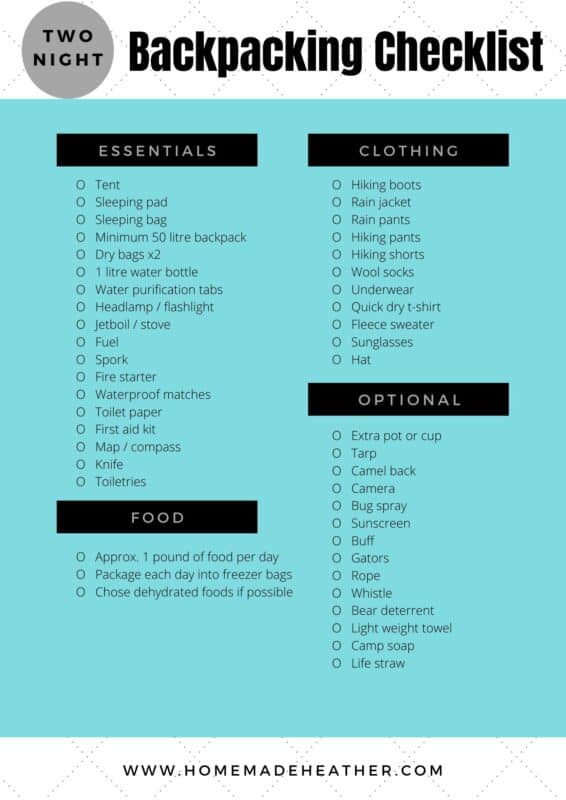
Simply right click on the photo above and save it to your computer or click on the google drive link below to download the original file.

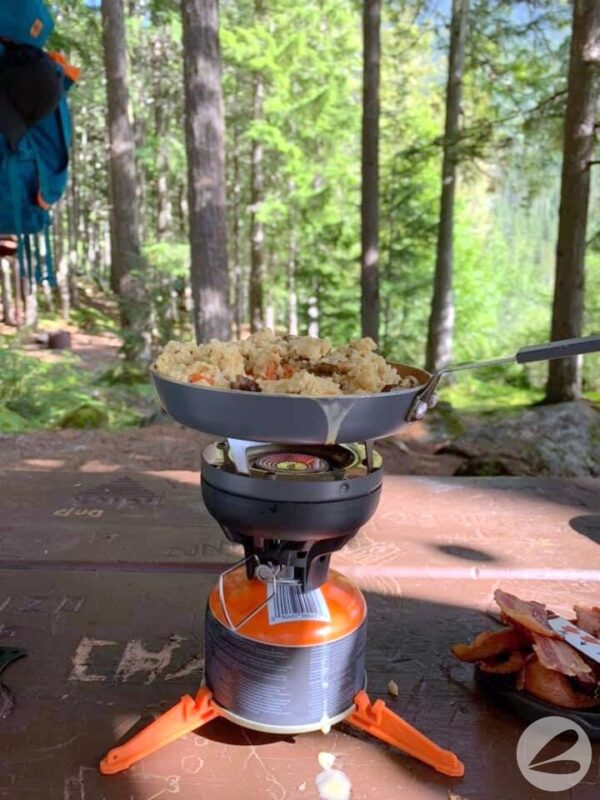

Looking forward to summer
Us too!!! <3